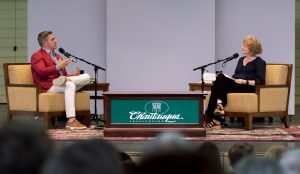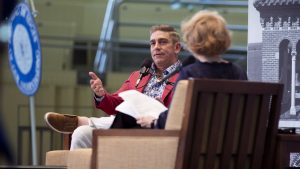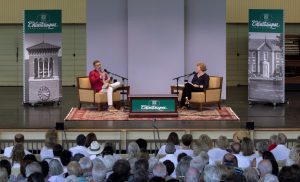
He was made in Cuba, assembled in Spain and imported to the United States, where he was named after Richard Nixon and Jesus Christ.
His name is Ricardo De Jesús Blanco, Richard Blanco for short, a man who was born connected to three countries and two figures, a foreshadowing of the questions of belonging that would ultimately shape his life.
Krista Tippett, journalist, author and host of “On Being with Krista Tippett,” interviewed Blanco, poet, author of 12 books and the fifth presidential inaugural poet in United States history, at 10:45 a.m. Wednesday in the Amphitheater, continuing Week Seven’s morning lecture series, “Grace: A Celebration of Extraordinary Gifts — A Week in Partnership with Krista Tippett and ‘On Being.’ ”
When Blanco’s mother was seven months pregnant, she and her family arrived as exiles from Cuba to Madrid. Forty-five days after Blanco was born, the family emigrated to New York City.
“I think that origin story, for me, ended up becoming part of the work, part of what I’m still thinking about: the story of our time and more specifically, the contents of America, my place at the American table, who I am as an American, what it means to be an American,” Blanco said.
The questioning of home — what it is, how it feels and how one claims it, is part of the classic “American drama,” Tippett said.
“Writing makes me think and thinking makes me write.” – @rblancopoet #CHQ2019
— The Chautauquan Daily (@chqdaily) August 7, 2019
“In some ways, I never really felt part of the American narrative, (but) I did question the idea of home,” Blanco said. “It’s still a question that I am still trying to unpack, and it’s gone through many arcs; periods of love and hate, periods of confusion and delight.”
Blanco was raised Catholic and attended Catholic parochial school from kindergarten to high school. Even though he was immersed in Catholicism his entire life, Blanco said he didn’t connect to the religion until he “came back to it” through writing.
“It started happening with writing,” he said. “Writing opened that door, that connection to the divine, to some connection to the universe, to things that be.”
But writing wasn’t always the path Blanco followed — based on career advice from his parents, Blanco began his career as a consulting civil engineer in Miami. However, in his mid-20s, he was compelled to express his creative side, a desire that was prompted by the uncertainty of his cultural identity.
“I learned a lot about writing poetry from my math classes, in terms of structure, logic, patterns,” he said. “Writing makes me think, and thinking makes me write; and there is a circularity to that, to dive deeper into questions, into yourself, into your soul, into your mind and heart.”
Blanco initially struggled with writing about his personal experiences, wondering if his “story of dislocation” was enough to be art for all, and not just a story for one.
“I always think, ‘What in this particular story do I have to offer universally?’ ” he said. “We all ask that question, ‘What is home?’ It’s like asking ‘What is love?’ It changes, it’s complex.”
From Blanco’s 1998 collection City of a Hundred Fires, he read “América,” the story of a Cuban family trying to “understand Thanksgiving,” the yearning of two homelands coming together under one roof.

“A week before Thanksgiving / I explained to my abuelita / about the Indians and the Mayflower, / how Lincoln set the slaves free; / I explained to my parents about / the purple mountain’s majesty, / ‘one if by land, two if by sea,’ / the cherry tree, the tea party, / the amber waves of grain, / the ‘masses yearning to be free,’ / liberty and justice for all, until / finally they agreed: / this Thanksgiving we would have turkey, / as well as pork.
“Faces fell when Mamá presented her ochre pie — / pumpkin was a home remedy for ulcers, not a dessert. / Tía María made three rounds of Cuban coffee / then Abuelo and Pepe cleared the living room furniture, / put on a Celia Cruz LP and the entire family / began to merengue over the linoleum of our apartment, / sweating rum and coffee until they remembered — / it was 1970 and 46 degrees — / in América. / After repositioning the furniture, / an appropriate darkness filled the room. / Tío Berto was the last to leave.”
Combining his knowledge of poetry and engineering, Blanco approaches poems like “América” as designs.
“My sense of place as an engineer is that everything has a physical landscape and an emotional landscape and a natural landscape,” Blanco said. “We live our life in space, in physical reality, but there is something else going on (in your heart) that is an emotional imprint. The ways those three things combine form our sense of place, belonging and connection.”
In Tippett’s lifetime, she said she has experienced how poetry rises up in culture, especially when “official discourse and words are failing us, or are inadequate, for what we have to grapple with.”
“(Poetry is helpful) when we really have to reach for new language to give voice to what we need and want to give voice to,” Tippet said.
Blanco said the more he writes, the more he sees poetry as a connection to the “music” playing within.
“In the same way we can hear a song and the words are saying something, there is an imprint that we can’t always place a finger on,” he said. “There is a beautiful pleasure, to know what it means on another level. In those empty spaces, poetry affects us that way, and it’s not usually taught that way. It’s not usually taught to just let it be in us, to let it breathe in us.”
In his most recent book, How to Love a Country, released in May, Blanco begins his acknowledgements with “Dime con quién andas, y te diré quién eres,” meaning “Tell me with whom you walk, and I’ll tell you who you are.” Blanco said the line is a tribute to stepping outside of his own story.
“I moved from the poetry of ‘I’ to the poetry of ‘we,’ ” he said. “I started thinking, ‘Who am I walking with? Who has come before me? Who has walked before me?’ With this idea of ancestors, you are born into someone else’s story, and you walk and you give that story to somebody else.”
The “we” for which Blanco writes encompasses all people, and particularly immigrants like himself. Tippett said the language used to describe immigration can generally do two things: The language can either foster empathy and awareness, or it can perpetuate exclusion.
“I think we all, in some ways, have sort of had it with this issue; we are concerned in the context of, ‘You mean to tell me that we can’t, not just as countries, as the Western Hemisphere, come to a kind of fair, amicable, humane, solution to this problem?’ ” Blanco said. “We are making it a problem.”
To tell a story of immigration in America, Blanco wrote “Complaint of El Río Grande.”

“Then countries — your invention — maps / jigsawing the world into colored shapes / caged in bold lines to say: you’re here, / not there, you’re this, not that, to say: / yellow isn’t red, red isn’t black, black is not white, / to say: mine, not ours, to say / war, and believe life’s worth is relative. / You named me big river, drew me — blue, / thick to divide, to say: spic and Yankee, / to say: wetback and gringo. You split me / in two — half of me us, the rest them. But / I wasn’t meant to drown children, hear / mothers’ cries, never meant to be your / geography: a line, a border, a murderer. / I was meant for all things to meet: / the mirrored clouds and sun’s tingle, / birdsongs and the quiet moon, the wind / and its dust, the rush of mountain rain — / and us. Blood that runs in you is water / flowing in me, both life, the truth we / know we know: be one in one another.”
Blanco said his words in “Complaint of El Río Grande” still move him, and he continues to learn from its message even now.
“I always say my poems are smarter than me; I’m not that smart,” he said. “I think, like songs, they continue to teach me. I go through this whole physiological experience when I read that poem and think about that river.”
The use of words like “migrant” and “refugee,” Tippett said, can negatively impact immigration conversations, and she further emphasized the power of language to change people’s perceptions. Blanco said people have challenged his use of the word “immigrant” to describe himself, as he was an infant when his family arrived in the United States. However, he maintains the use of the word in his life and his writing.
“Where I think all of those spaces connect is ‘immigrant,’ ” Blanco said. “Whether you’re in exile, a migrant or refugee, we should embrace people that are going through things and try to help each other like decent human beings. That experience of ‘immigrant’ has a lot of common ground.”
Blanco can’t imagine the reality of returning to his home country, a place he spent less than two months of his life. To consider that concept, both for himself and DACA “Dreamers,” Blanco wrote “Como Tú / Like You / Like Me” for How to Love a Country.
“Like memory, at times I wish I could erase / the music of my name in Spanish, at times / I cherish it, and despise my other syllables / clashing in English. Como tú, I want to speak / of myself in two languages at once. Despite / my tongues, no word defines me. Like words, / I read my footprints like my past, erased by / waves of circumstance, my future uncertain / as wind. Like the wind, como tú, I carry songs, / howls, whispers, thunder’s growl. Like thunder, / I’m a foreign-borne cloud that’s drifted here, / I’m lightning, and the balm of rain. Como tú, / our blood rains for the dirty thirst of this land. / Like thirst, like hunger, we ache with the need / to save ourselves, and our country from itself.”
Tippett said Blanco, like many poets, can articulate despair, but doesn’t often find the means to articulate hope. According to Blanco, hope is found in people standing up for one another.
“It happened after the Muslim ban, where people, for the first time in my lifetime, were standing up for something that didn’t affect them directly — that is democracy,” Blanco said. “I think we are stepping up and realizing that the quality of life, the virtue of this country, depends on every human being’s story; our happiness depends on other people’s happiness.”
Blanco wrote about this idea of dependence, or “interdependence,” in How To Love a Country’s opening prose poem, “Declaration of Interdependence.”
“We’re the dead, we’re the living amid the flicker of vigil candlelight. We’re in a dim cell with an inmate reading Dostoevsky. We’re his crime, his sentence, his amends, we’re the mending of ourselves and others. We’re a Buddhist serving soup at a shelter alongside a stockbroker. We’re each other’s shelter and hope: a widow’s fifty cents in a collection plate and a golfer’s ten-thousand-dollar pledge for a cure. We hold these truths to be self-evident …
“We’re the cure for hatred caused by despair. We’re the good morning of a bus driver who remembers our name, the tattooed man who gives up his seat on the subway. We’re every door held open with a smile when we look into each other’s eyes the way we behold the moon. We’re the moon. We’re the promise of one people, one breath declaring to one another: I see you. I need you. I am you.”
Blanco reads a poem from his book. The amp is filled with applause. #CHQ2019
— The Chautauquan Daily (@chqdaily) August 7, 2019




